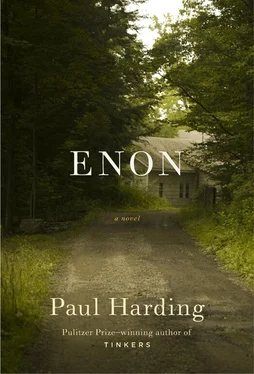Paul Harding - Enon
Здесь есть возможность читать онлайн «Paul Harding - Enon» весь текст электронной книги совершенно бесплатно (целиком полную версию без сокращений). В некоторых случаях можно слушать аудио, скачать через торрент в формате fb2 и присутствует краткое содержание. Жанр: Современная проза, на английском языке. Описание произведения, (предисловие) а так же отзывы посетителей доступны на портале библиотеки ЛибКат.
- Название:Enon
- Автор:
- Жанр:
- Год:неизвестен
- ISBN:нет данных
- Рейтинг книги:3 / 5. Голосов: 1
-
Избранное:Добавить в избранное
- Отзывы:
-
Ваша оценка:
- 60
- 1
- 2
- 3
- 4
- 5
Enon: краткое содержание, описание и аннотация
Предлагаем к чтению аннотацию, описание, краткое содержание или предисловие (зависит от того, что написал сам автор книги «Enon»). Если вы не нашли необходимую информацию о книге — напишите в комментариях, мы постараемся отыскать её.
Powerful, brilliantly written, and deeply moving Paul Harding has, in Enon, written a worthy successor to Tinkers, a debut which John Freeman on NPR called "a masterpiece." Drawn always to the rich landscape of his character's inner lives, here, through the first person narrative of Charlie Crosby (grandson to George Crosby of Tinkers), Harding creates a devastating portrait of a father trying desperately to come to terms with family loss.
Enon — читать онлайн бесплатно полную книгу (весь текст) целиком
Ниже представлен текст книги, разбитый по страницам. Система сохранения места последней прочитанной страницы, позволяет с удобством читать онлайн бесплатно книгу «Enon», без необходимости каждый раз заново искать на чём Вы остановились. Поставьте закладку, и сможете в любой момент перейти на страницу, на которой закончили чтение.
Интервал:
Закладка:
I rose and convulsed from the cold and retched from the poison. I looked over at the snow-covered golf course, where kids sledded every winter, and imagined the dead having sledding parties at midnight, on the back slope of the hill, warming their finger bones in blue fires that they kindled in granite urns, laughing when they held their hands inside the flames. I imagined them melting clumps of dirty ice in a tin bucket over the fire and drinking the hot muddy brew and cackling with glee as it ran off the backs of their jawbones and spattered down their ribs. I imagined them using headstones for sleds. The idea made me nauseated and I repented of it. I had the urge to go to Kate’s stone and kneel in front of it and say, I’m sorry, over and over again, because no matter how much I knew better, I could not stop myself from stepping over the same dark threshold, night after night, trying to follow her into the country of the dead in order to fetch her back, even though she visited me in dreams and never left my waking thoughts. Memories of her feeding the birds and practicing running and playing cribbage were not enough. I was ravenous for my child and took to gorging myself in the boneyard, hoping that she might possibly meet me halfway, or just beyond, one night, if only for an instant — step back into her own bare feet, onto the wet grass or fallen leaves or snowy ground of the living Enon, so that we could share just one last human word.
8
KATE WAS WITH HER BEST FRIEND, CARRIE LEWIS, WHEN SHE was killed. They were riding their bikes, in tandem, along the curve the road made around Enon Lake. Carrie had been in front of Kate. The last time I had seen Carrie was at Kate’s funeral. She was with her mother, Helen, and her dad, whose name I did not remember. She wore a black dress with her hair pulled back and no jewelry and no makeup. She cried so much and so hard that her parents took her away from the ceremony behind a tree a few dozen yards from the grave site to try to calm her. Her grief undid me all the more, because she, unlike me, had seen Kate underneath the car, mixed up with the wrecked bike. It was impossible for me to get the image of Kate’s shoulders and the split helmet covering the top of her head, framed in bent metal, underneath the front of the car — what I imagined Carrie would have seen — out of my mind. I did not see Carrie at the reception after the funeral. I am not even sure that she came. I did see her mother, though, so maybe her father had taken her home.
Helen Lewis showed up at the house one afternoon in February. I never would have answered the door, but as it happened I was just leaving to walk in the swamp. I was not paying attention and had my head down, probably running through a calculation about how many pills to bring, and I didn’t see the car in the driveway and Helen heading for the back porch. I was reaching for the doorknob when she knocked. She clearly saw me and I had no choice but to open the door.
“Oh, hi, Charlie,” she said. “I’m so sorry to bother you—”
I had not seen myself in a mirror for weeks but it was clear from the expression on Helen’s face that I was in bad shape. She was surprised, not because I looked horrible but because I looked more horrible than she had been prepared for.
“No, Helen. No,” I said. “It’s fine. I’m sorry I haven’t called to see how—”
The conversation was already hopeless. It was obvious why I had not and could not have been in touch.
“No, Charlie, you shouldn’t — I mean, it’s okay. Carrie’s. Well, it’s been rough, but, I mean, you’ve been so much more—” Helen took a step backward and held out a baking dish covered in tinfoil. “I hope it’s okay. I just brought a lasagna—” Idiotically, I raised the dish to my face and sniffed at the foil. I could not smell the lasagna.
“No, that’s so nice of you, Helen. It smells wonderful.”
“Charlie, can we do anything? We’ve heard — I mean, it sounds maybe like you could use—”
“No, not at all, Helen. I mean, I know. I’m a little worse for the wear, but I’m doing good, doing better.” I could not look Helen in the eyes, but I could tell she was sneaking glances into the house behind me. I could tell that she saw the filthy, moldy dishes and the papers and tools and junk piled on the table and the counters and the stove and scattered all over the floor and I wasn’t sure if it actually happened or was just a part of my horror but it seemed as if at that moment some foul gust exhaled out the door and enveloped us and Helen blanched. She took a step back.
“Charlie. I feel like — a few people feel like, that maybe you might need a little bit of—” I put my hands up, like a soldier in a movie surrendering. I realized that Helen was frightened of me. Not because I had been a violent guy or had a bad reputation but because she thought I might be mentally ill, I might be deranged, even capable of harming someone.
“Ah, Helen, you got me; you’re right. It has been bad. Real bad, I guess. But I promise you, it’s better. Corners have been turned. Susan’s been gone, and it’s been real rough. But I think she’s coming back, and I’m coming back, you know, back here . And I know it looks bad—” I felt out of breath, and transparently full of shit. Helen had backed up toward her car. I lowered the volume of my voice, and lowered my hands, and said more deliberately, “I know it looks bad, Helen, but, please. I just can’t.”
“Okay, Charlie. Well, I hope you enjoy the lasagna,” Helen said. She opened her car door and put one foot in. “We’re around. Call if we can help.”
I tried to smile and look upbeat, and said, “Will do!” and waved, but Helen was already looking over her shoulder, backing out of the driveway.
I WOKE UP EARLY one morning on the couch. I woke up every morning on the couch. It felt like the same morning all the time, or like an infinite series of nested dreams from which every day I imagined I awoke but I only ever really arose into another dream. When my mood was not pitch-black, I thought it would be interesting to come up with a Homeric formula for waking up on the couch, an invocation that would ennoble the act, make it more like poetry, less like a monotonous personal apocalypse. The couch as a ship. The couch as a ship sailing to retrieve the lost daughter. Grieving Charles, Crosby Undaughtered, piloting the couch, sorrowdark and stitch-loosed, through all of Oceandeath, forever, until he spies golden Kate, shining and whole, hanging steadfast from the horn of a low moon .
It was early spring or, I guess, very late winter — sometime in the second or third week of March. The sun had not yet risen but was about to. Light was beginning to flood earlier up the shores of the mornings and ebb away later in the evenings, accelerating as the planet pulled alongside the sun in equinox. Despite the gelatinous, nervy pain of the previous night’s drugs, I felt the necessity of watching the sun rise, as if to roll over and tuck my head back into the corner of the couch and sleep through the dawn would be blasphemous even for a decrepit soul like me. There was still a thread, tenuous, strained, barely but still holding, connecting that drugged and bleary consciousness with the mornings when we were fishing in Maine and had to get up early in order not to miss breakfast in the dining hall and my grandfather, who had been up for an hour already, dressing in the cold, washing with cold water from the spring, singing, deliberately provoking me in my warm cocoon of sleep, would finally come to the foot of my bed and sing in his loudest buffo tenor, Ringy dingy! , just ahead of the actual ringing of the bronze bell in the dining hall belfry, and bang the bed’s metal foot rail with the poker from the woodstove and yank the blankets from me, leaving me uncovered in the frost-shot morning. His gusto during those freezing sunrises angered and delighted me. I cringed almost in pain at how sleepy and cold I was, hunched up into myself on the bed, the chilled air piercing me. Sometimes I growled at my grandfather, which amused him more and made me even grumpier. But I admired his heartiness, the spirit he seemed to imbibe from the clean cold tonic northern morning. Although I had always been gentler about it, I had done the same thing to Kate on cold school mornings in our home — bright autumn mornings, dark winter mornings, rainy spring mornings — when it was then me who had already been up for an hour, drinking coffee, smoking a cigarette, and reading the morning paper in the quiet left behind by Susan after she’d gone to work. I’d enter Kate’s room and pull the shades up in the windows and sit on the edge of her bed and pet her back and kiss her head and singsong, Oh, Ka-ate; it’s time to get u-up! She’d turn and groan and screw herself up more tightly in her blankets. I’d tickle her behind one of her ears and she’d unsheathe one of her arms from within the blanket and swat at me and growl for me to leave her alone and Stop , Dad. I know, my little Katie-cat, I’d say. You’re all curled up and cozy like a kitten in a den. I know just how you feel. But it’s a new day and life is good and get up and get dressed and we’ll get you some hot grub. This was a gentler version of my grandfather’s stagy, gruff rousings. And I felt such love for my kid in those moments, such a sense of how good it was that she was safe and warm and cared for and healthy, how charming it was that within such larger goodness she was a little cranky, a little feisty. I also felt in those moments how much my grandfather must have loved me when he got me up those mornings for fishing. And I wondered at how when his mother or father had gotten him up when he was a kid it might have been with a love that I and even less Kate hardly could have recognized, because getting up when he had been a kid often enough had been so that no one would actually freeze or starve to death.
Читать дальшеИнтервал:
Закладка:
Похожие книги на «Enon»
Представляем Вашему вниманию похожие книги на «Enon» списком для выбора. Мы отобрали схожую по названию и смыслу литературу в надежде предоставить читателям больше вариантов отыскать новые, интересные, ещё непрочитанные произведения.
Обсуждение, отзывы о книге «Enon» и просто собственные мнения читателей. Оставьте ваши комментарии, напишите, что Вы думаете о произведении, его смысле или главных героях. Укажите что конкретно понравилось, а что нет, и почему Вы так считаете.












